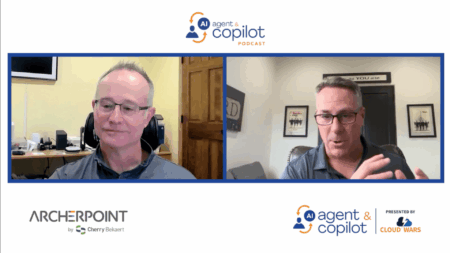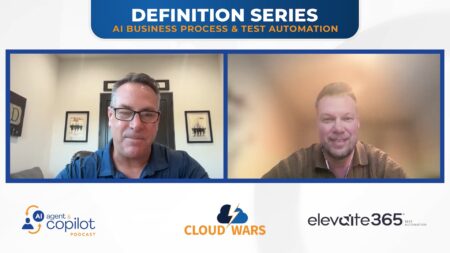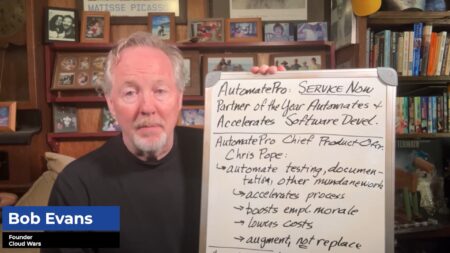
Welcome to this exclusive interview with Christian Klein, CEO of SAP, part of the Acceleration Economy Cloud Wars Top 10 CEO Outlook 2023 series.
Klein met with Cloud Wars founder Bob Evans and spoke on a range of topics including what’s driving the company’s strong financial performance, how RISE with SAP is attracting customers, and why big customers including BMW, Merck, Porsche, and others are selecting SAP.
Highlights:
00:57 — Bob asks Klein to recap the past three years since he joined as CEO, culminating in very strong Q4 financial results.
01:13 — Klein notes his daughter was born the same night that he became CEO, recalls how exciting that time was, and how the time since has flown. The journey started the transformation of SAP — not only moving to the cloud but also helping customers transform. Klein points out the company has accelerating cloud momentum while it tackles the most pressing needs of customers, all while changing the SAP culture to focus on customer success.
02:50 — Cloud revenues are now 40% of total revenue. Bob asks what it is that gives customers the confidence that SAP’s the partner to take their business into the digital future and what makes Klein bullish about 2023.
03:27 — SAP’s on-premise business is no longer as impactful on its financial results, Klein says, and the changing mix in favor of the cloud is contributing to strong performance. When Klein talks with CEOs, especially in times like this with inflationary and other economic pressures, it’s clear they want to continue with their transformations — whether that’s in utilities, oil and gas, or automotive industries. They are also prioritizing process automation. It’s important for SAP to analyze where manual processes are for customers and ask how businesses can automate with AI — not only coding AI but embedding it into products so that customers can consume it out of the box.
05:03 — SAP customers are highly focused on supply chains; Klein met with a chemical company the day of this interview and their main concern is making their supply chain more resilient. They’re asking for help to minimize supply chain disruptions. They also have a big focus on sustainability. SAP’s role has to be embedding ESG data in its core product so that customers aren’t tracking sustainability data in Excel. SAP’s also looking to help CIOs once they’ve chosen their cloud service provider by providing a harmonized set of service-level agreements (SLAs) that bring together the various dimensions of the technical architecture, including cybersecurity and system performance.
08:08 — As SAP transformed, it increased its focus on optimizing the end-to-end IT lifecycle but also providing best practices in the customer’s industry. That includes benchmarking and recommending how to automate and use its platform.
09:27 — Bob notes that in SAP’s recent earnings call, Klein referenced RISE with SAP as the heart of its strategy and one of its most successful offerings ever. RISE lets customers consume services on their terms in the way that’s best for them.
10:15 — Klein says SAP’s platform business started almost from zero and now it’s a 1.5-billion euro business growing in the 40s and 50s percent range. Even more so for S4/HANA in the cloud; it started almost from scratch and now it’s a business of over two billion euros, growing by 90%. It’s not only about the technical migration, it’s about transformation, and that applies to customers including Porsche, Merck, Daimler, and additional large customers. RISE is the umbrella to connect business processes, systems, and data.
11:59 — This is a vaunted technology company that for 50 years has been making some of the most successful and complex technology in the world, but it was a non-technology product that kicked the whole transformation into high gear, Bob notes, calling it a remarkable shift.
13:12 — RISE sparked a transformation of SAP that included new technology and delivering everything as a service, but what also came with it is a new way of running SAP. It’s about not only about positioning and selling but also making sure the architecture fits for the customer, that the migration and the implementation work. What’s involved are systems where, when something is falling apart, the company stands still.
14:26 — SAP’s always worked with some of the world’s largest corporations, but recently the company won some massive deals. Bob asks Klein to talk about the goals of leaders at BMW, Merck, Porsche, and Daimler.
14:54 — BMW and SAP have a fantastic partnership, but BMW wanted to take it to the next level. They wanted to get CEOs of big materials providers and supply chain partners — many of them using SAP — together in a network because their supply chain needs to become more resilient. They also asked for help in automating manufacturing, Klein notes. SAP has a great partnership with Siemens where SAP builds vertical integrations into shop floor automation, predictive maintenance for the equipment, automates a lot of activities around logistics and warehousing, and much more, including supply chain planning.
17:18 — Porsche is similar. They also had a sustainability angle — wanted to prove how sustainable the shift to electric vehicles it. They were looking to set a standard for carbon accounting in the automotive industry with Catena-X, bringing suppliers together. Merck, whose partnership with SAP reflects the booming business in healthcare, is a company that does a lot of research. SAP looked at how it can help on the data layer, harmonizing the data layers across the company, and infusing external data. It always starts on the business side. And, of course, the cloud is then the deployment model which gives them the speed and agility that all customers need.
19:07 — In addition to doing this for individual companies, SAP is also doing it for industry verticals. Customers need that vertical expertise. SAP goes to the ecosystem and pulls in a lot of partner solutions to build its software and the vertical solution and customers get a holistic offering.
20:55 — More and more, customers are saying they don’t want to just be the consumer of technology from a company like SAP, but they want to create technology. Bob asks Klein how much he’s seeing this co-creation trend, and whether it will be big in 2023.
21:31 — “Spot on,” Klein says, and there will be an announcement targeting this, especially the small and mid-sized markets; let’s not forget that 80% of SAP’s customers are in this segment. The Porsches and the Mercks are very important, but 80% of SAP customers are coming from small and mid-sized enterprises (SMEs) and that’s oftentimes forgotten. What’s in it for them? They want to have software that helps them to scale and automate and it doesn’t take months to go live. These are the next Walmarts and Porsches of the world.
23:49 — Klein offers optimism amid talk of recession and geopolitical tensions, noting he’s a big believer that technology can help to keep supply chains resilient and to make this world a better place, especially when it comes to sustainability.
This post and video are available to read here for 24 hours only, after which time an Acceleration Economy subscription will be required for exclusive access.
Sign up here for the CEO Outlook Digital Summit to start your free subscription and see all of the Cloud Wars Top 10 CEO Outlook interviews that will air on February 8, 2023, or upgrade to Premium and get your all-access pass to our entire practitioner analyst library of content









